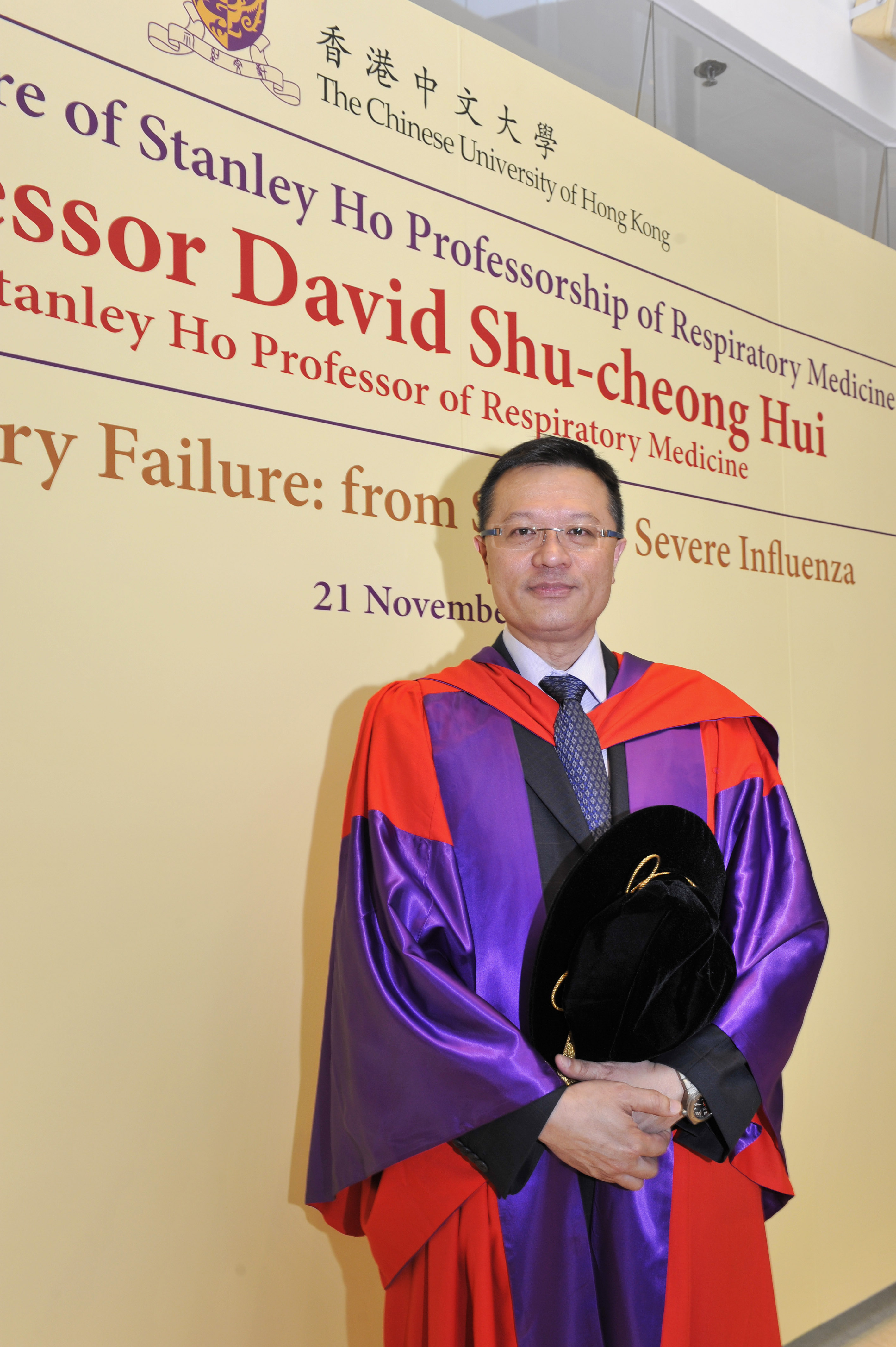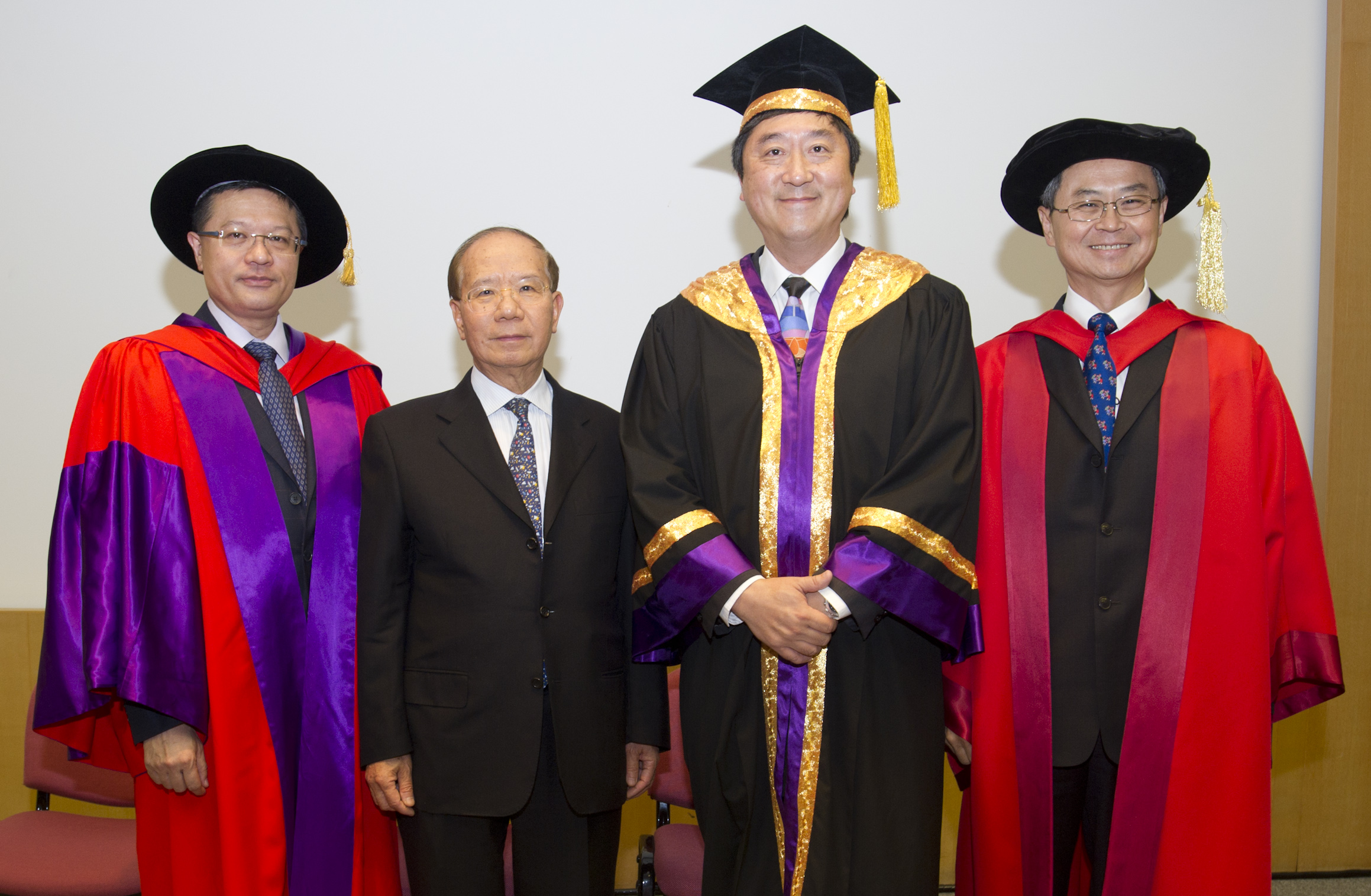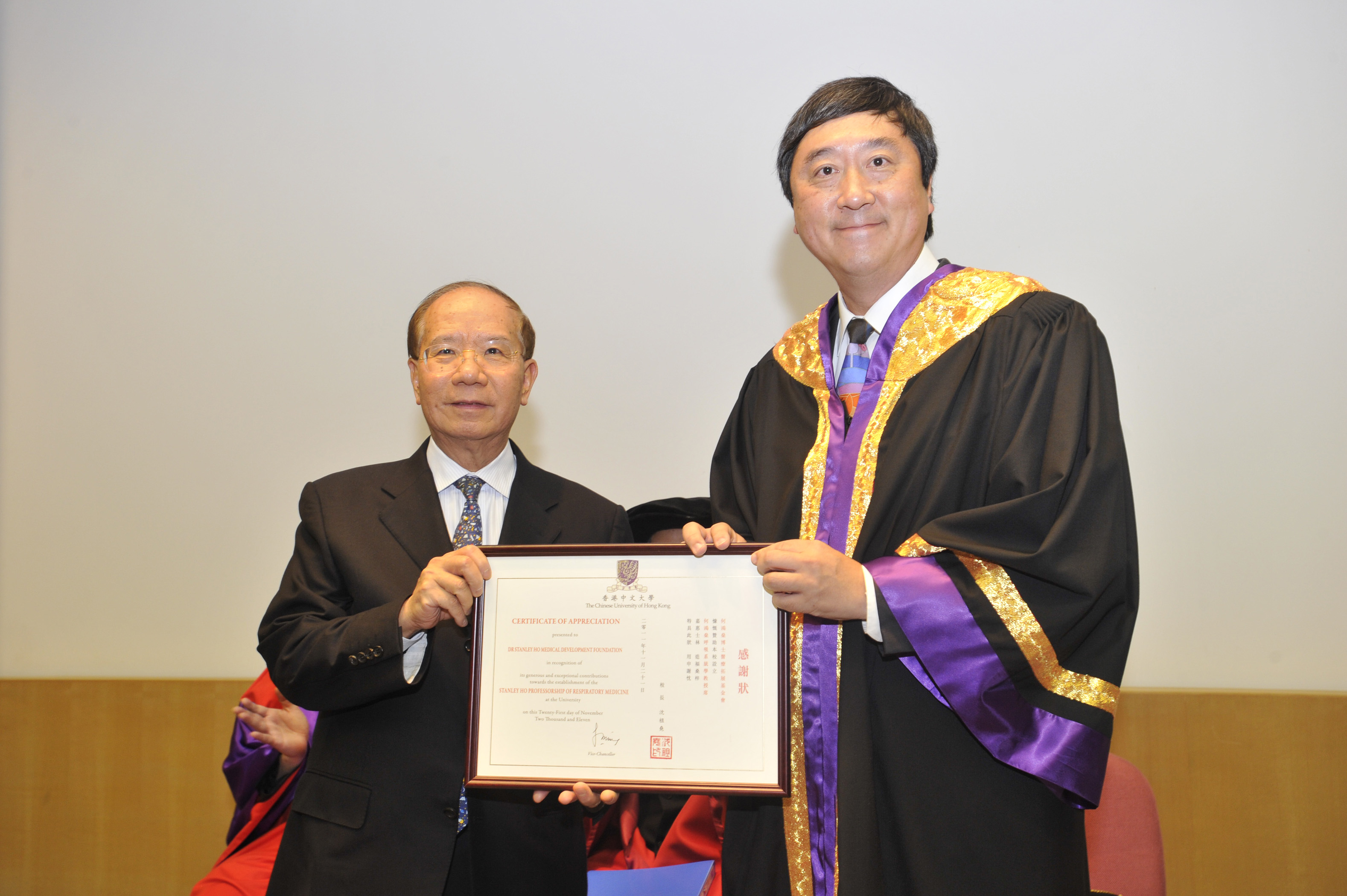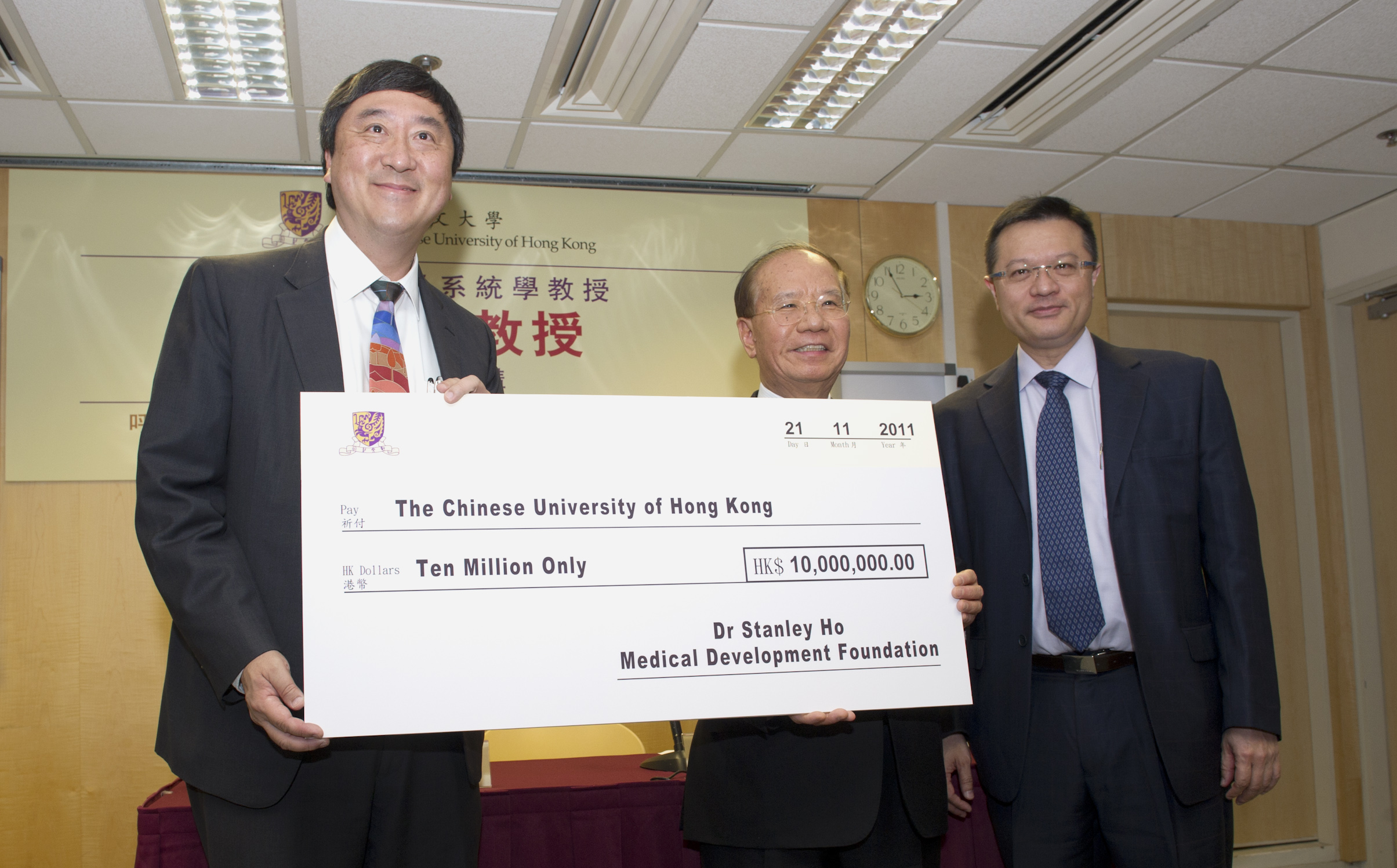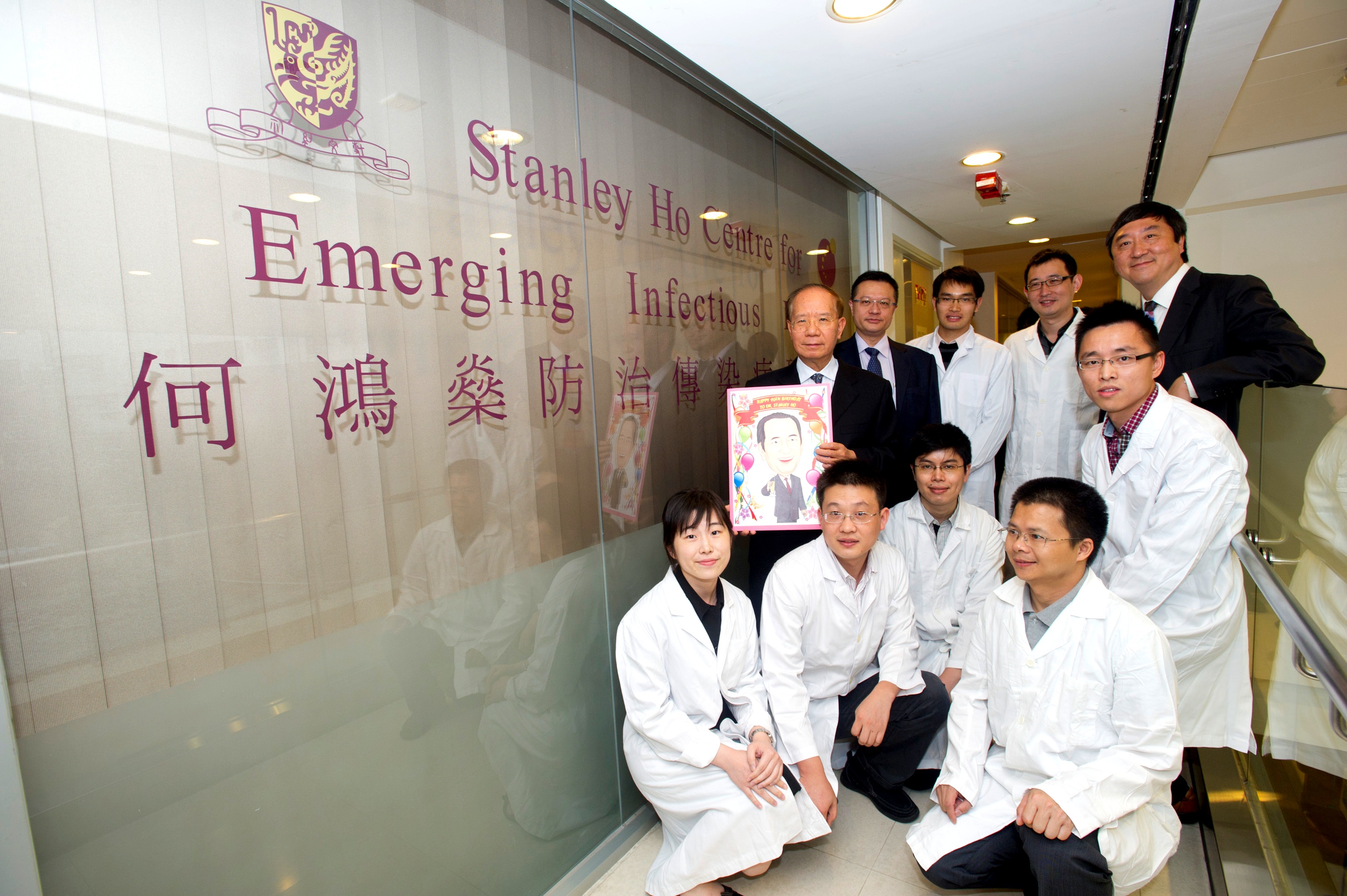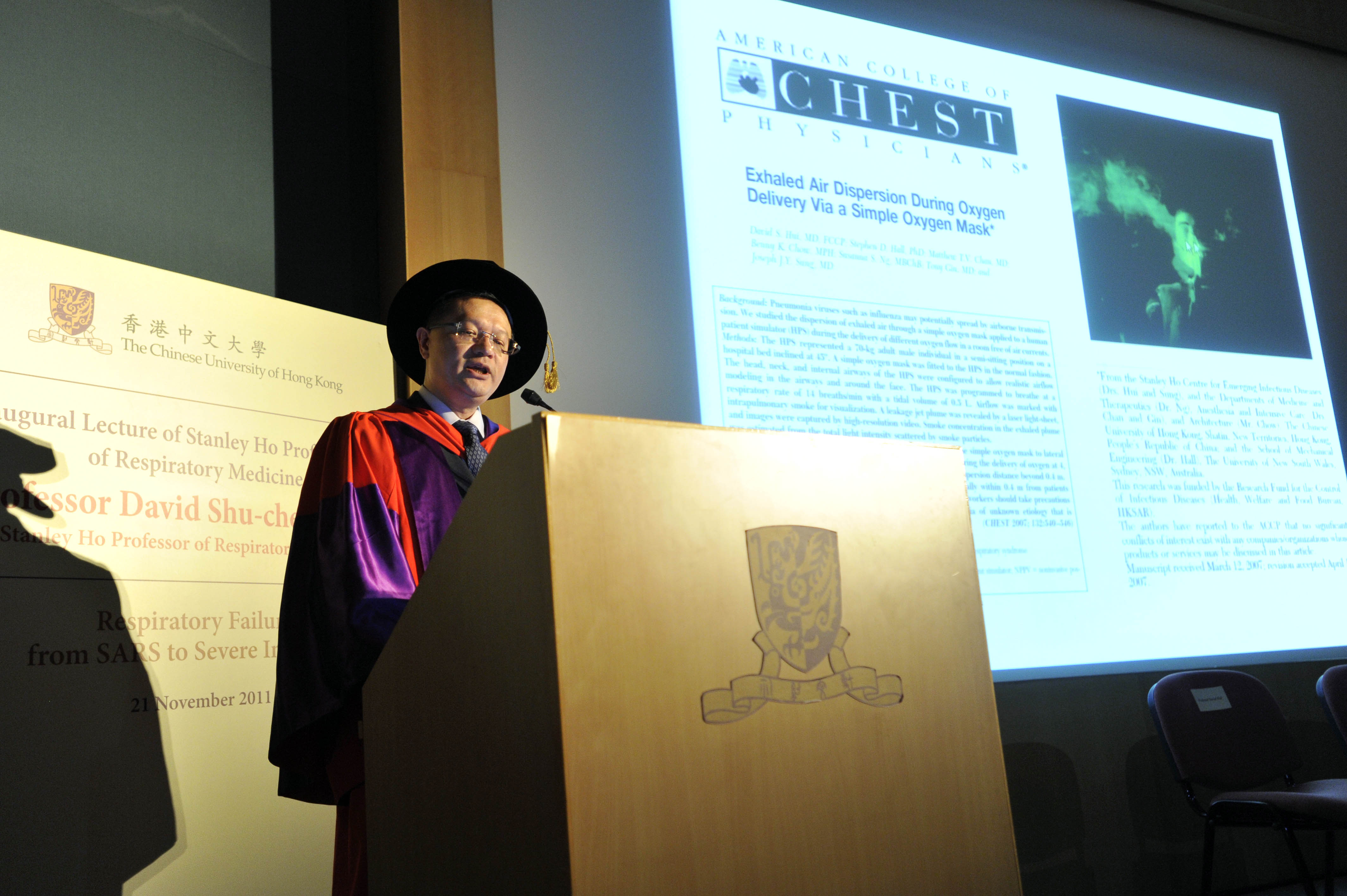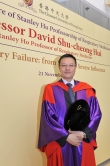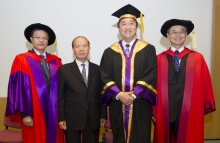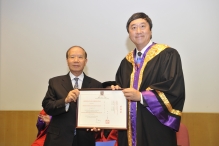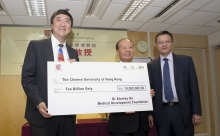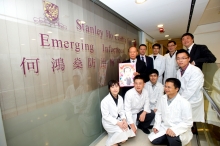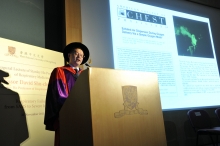CUHK
News Centre
Inaugural Lecture of Stanley Ho Professorship of Respiratory Medicine by Professor David Hui’Respiratory Failure: from SARS to Severe Influenza’
Respiratory failure is a syndrome in which the respiratory system fails in one or both of its gas exchange functions: oxygenation and carbon dioxide elimination. Respiratory failure is a major complication of emerging respiratory infections such as SARS, avian influenza H5N1, and pandemic influenza (H1N1) 2009 infection. Rapid and effective oxygen delivery is an essential component in the clinical management of critically ill patients with respiratory failure. While mechanical ventilation via non-invasive ventilation (NIV) or tracheal intubation is required in the more severe cases, oxygen therapy is often applied during the early stage of treatment. These procedures however may generate respiratory droplets and are a potential source of infectious pathogens.
During the major outbreak of SARS, endotracheal intubation, oxygen therapy and NIV were independent risk factors for major hospital outbreaks affecting many healthcare workers. There is recent evidence that NIV may convert droplets into opportunistic airborne transmission in a medical ward with uneven airflow. A multi-disciplinary research team of clinicians, architects, and anaesthetists/intensivists led by Professor David Hui, Head, Division of Respiratory Medicine, Department of Medicine and Therapeutics examined the exhaled air dispersion during application of common respiratory therapy in a hospital isolation room setting. It is shown that the maximum dispersion distance of exhaled air through the side vent of the jet nebulizer, driven by 6 L/min of air, was about 0.8m lateral to the patient. It is also demonstrated that the exhaled air distances from patients receiving oxygen therapy could extend to 1m towards the end of the bed. During NIV, the dispersion distances from some masks are predictable whereas other masks that require connection to the carbon dioxide removal device will lead to more widespread room contamination, especially if NIV inspiratory pressures are too high.
The World Health Organization (WHO) has defined anairborne precaution room as a room with at least 12 air exchanges/hr (ACH) if mechanically ventilated and negative pressure is created to control direction of airflow to contain airborne infections. The team’s recent research work comparing the efficacy of the isolations rooms at the Prince of Wales Hospital (PWH) versus the rooms at the Princess Margaret Hospital (PMH) has shown that the larger isolation room with 16 ACH at PMH is relatively better than the smaller isolation room with 12 ACH at PWH in air mixing and removing exhaled air from the patient and preventing room contamination during application of oxygen therapy and non-invasive ventilation. In addition, its latest research work has shown that the N95 mask is far better than the surgical mask in reducing exhaled air from the patient during coughing. During normal cough efforts, the exhaled air dispersion distances were 68cm, 30cm, and 15cm when the patient wore no mask, a surgical mask and a N95 mask respectively whereas the sideway dispersion distances were 0cm, 23cm and 13cm respectively. Finally, during active resuscitation by manual ventilation, an addition of a viral bacterial filter can stop air leakage through the expiratory diverter but it may increase sideway leakage.
The research work of Professor Hui’s team has provided useful information to international health organizations and professional societies in their pandemic influenza preparedness in the clinical management of severe respiratory failure.
Key messages:
- Active resuscitation and respiratory therapy for patients with severe viral pneumonia may potentially convert droplets into opportunistic airborne transmission.
- Room dimension and air exchange rateare important factors in isolation room design to prevent room contamination by exhaled air from the infectious patient who requires oxygen therapy or non-invasive ventilation for respiratory failure.
- The N95 mask is better than the surgical mask in reducing exhaled air during coughing.
- Viral bacterial filter can stop leakage through the expiratory diverter during active resuscitation by manual ventilation but it may increase sideway leakage.
About Stanley Ho Professorship of Respiratory Medicine and the Dr Stanley Ho Medical Development Foundation
The Dr Stanley Ho Medical Development Foundation (the Foundation) established the Stanley Ho Professorship of Respiratory Medicine in November 2011 in support of academic research on respiratory medicine and infectious diseases. The first incumbent of the Stanley Ho Professorship of Respiratory Medicine is Prof. David Hui, Department of Medicine and Therapeutics, CUHK. Professor Hui is currently Director of Stanley Ho Centre for Emerging Infectious Diseases. The University is grateful for the staunch support of the Foundation to enable further advances in teaching and research, and also foster academic development.
The Foundation was established in January, 2005 with the aim to promote, develop and sponsor academic research, exchange and public education of social, hygienic, healthcare, medical, technological, social and charitable activities so as to increase the quality of the academic research in these areas and to facilitate the exchange of these knowledge amongst China, Macau and Hong Kong.
Since its establishment, the Foundation has sponsored Macau medical and healthcare professionals to receive on the job training at the Faculty of Medicine, CUHK in order to enhance their professional standards and to narrow the gap in the respective levels of medical services of these two places. Since 2006, and thereafter every year, the Foundation has organized medical symposiums in Macau, for which various professors and clinical experts from the Faculty of Medicine, CUHK were invited to introduce to the local professionals the latest development in their own area of expertise and to share their experience. The Symposium held in January this year is the sixth of such Symposiums.
The Foundation has set up in its Exhibition Hall in Macau a ‘Health Land’, where the students, parents and members of the public may be introduced, by interactive technologies, to the general knowledge about common diseases and their methods of prevention. The Foundation also actively supports the training, conference and educational activities of different healthcare organizations in Macau. In addition to providing the venue and its facilities, the Foundation also assists to bring in expert speakers from mainland China, Hong Kong and Taiwan, making these activities more informative and useful.
In recent years, the Foundation also actively promotes the awareness of the public about the Alzheimer’s Disease, the care of patients suffering from this disease and the provision of support to the family members of such patients and the study of the related illness, in order to deal with the impact of the ageing population. The Foundation puts special emphasis on, and will step up its support for, the research of local diseases and those diseases caused by a degeneration of organs.
The Foundation warmly welcomes the appointment of Professor David Hui as the first Stanley Ho Professor of Respiratory Medicine. Mr. Patrick Huen, the Vice Chairman of the Board of Trustees of the Foundation, pointed out that as early as 2003 during the SARS period, Professor Hui had already provided clinical recommendations and case diagnoses to the healthcare professionals in Macau through telephone and video conference facilities. Professor Hui also hosted seminars in Macau on different occasions, briefing the local medical and healthcare professionals on the latest research development and trends in respect of sleep disorder and infectious diseases. Professor Hui has also assisted in the on-the-job training of overseas professionals at the Facility of Medicine, CUHK and attended as a speaker at the symposiums organized by the Foundation. In 2011, Professor Hui joined as a member of the Board of Trustees of the Foundation. Now that Professor Hui has been appointed as the first Stanley Ho Professor of Respiratory Medicine, the Foundation is very pleased to have Professor Hui’s continued counsel. This appointment also serves as a recognition of his academic achievement and his contribution to the Foundation.
Mr. Huen reiterated the mission of the Foundation at this joyous occasion today, and tendered his appreciation to CUHK for its continued support to the Foundation. ‘The Foundation hopes to continue to co-operate with the Faculty of Medicine, The Chinese University of Hong Kong through various ways and means so as to continuously enhance the standards of the medical and healthcare professionals in China, Hong Kong, Macau and Taiwan and to facilitate the exchange of knowledge amongst them. This is the aim of the Foundation and also the focus of our efforts,’ said Mr. Huen.
For more photos, please visit:
https://www.cpr.cuhk.edu.hk/en/events_recap_detail.php?id=42&s=
(From left) Prof. David Shu-cheong Hui, Stanley Ho Professor of Respiratory Medicine, and Head, Division of Respiratory Medicine, Department of Medicine and Therapeutics, Faculty of Medicine, CUHK; Mr. Patrick W.M. Huen, Vice Chairman, Board of Trustees, Dr. Stanley Ho Medical Development Foundation; Prof. Joseph J.Y. Sung, Vice-Chancellor, CUHK; Prof. Fok Tai-fai, Dean, Faculty of Medicine, CUHK
Prof. Joseph J.Y. Sung presents a certificate of appreciation to Dr. Stanley Ho Medical Development Foundation, received by Mr. Patrick W.M. Huen.
On behalf of Dr. Stanley Ho Medical Development Foundation, Mr. Patrick W.M. Huen presents the cheque to CUHK, received by Prof. Joseph J.Y. Sung.
A research team from the Stanley Ho Centre for Emerging Infectious Diseases at CUHK presents a birthday card to Dr. Stanley Ho as a gesture of thanks to Dr. Ho for his staunch support to CUHK, and to celebrate Dr. Ho’s 90th birthday. The card is received by Mr. Patrick W.M. Huen on Dr. Ho’s behalf.


